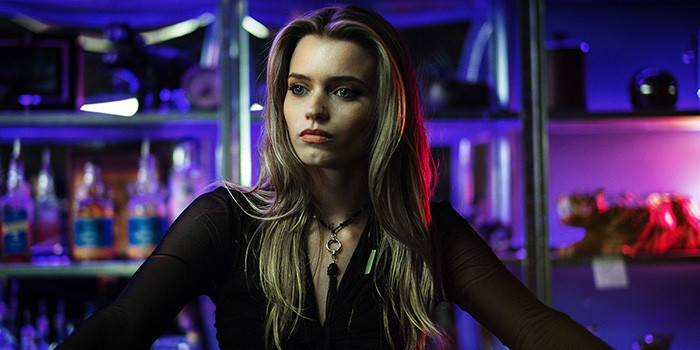Stephen McCallum’s film Outlaws roars onto the screen, immediately sparking comparisons. While I initially resisted the urge to measure it against the cultural phenomenon that was Sons of Anarchy, the script, penned by Matt Nable, makes such comparisons almost unavoidable. The core narrative revolves around the Copperheads Motorcycle Club, led by the ambitious Paddo (Ryan Corr), who seeks to steer the gang towards legitimate ventures. This ambition clashes head-on with the club’s president, Knuck (Matt Nable), newly released from prison and hungry to reclaim his violent reign. This central conflict, pitting a “new guard” against an “old guard” within the Biker Gang Outlaws world, echoes familiar themes of loyalty, power, and the corrosive nature of outlaw life.
The strength of television series like Sons of Anarchy lies in their extended runtime, allowing for deep character development and intricate plot weaving. Outlaws, constrained by its ninety-minute format, struggles to achieve the same depth. The supposed father-son dynamic between Knuck and Paddo, crucial for understanding their fractured relationship, is relegated to a single, almost throwaway line. This revelation, arriving only when their ideologies are irreconcilably divided, feels forced, making it difficult to believe in any genuine bond between them. It suggests a rapid erosion of trust and understanding, a common casualty in the volatile world of biker gangs where shifting power dynamics can shatter even the strongest alliances. The film hints at the transformative impact of time and prison, turning one man into a figure of paranoia and the other into a pragmatist, showcasing the brutal realities that can reshape individuals within the outlaw motorcycle club environment.
Where Outlaws particularly stumbles in comparison to narratives like Sons of Anarchy is in its portrayal of women. Unlike the complex and often morally ambiguous female characters in its television counterpart, the women in Outlaws – Knuck’s wife Hayley (Simone Kessell) and Paddo’s girlfriend Katrina (Abbey Lee) – are depicted as purely manipulative figures. Hayley isn’t a conflicted maternal presence, and Katrina isn’t a force pulling her lover away from the criminal underworld. Instead, they are portrayed as cold, calculating, and solely driven by a desire for control. Hayley’s whispers fuel Knuck’s distrust of Paddo, while Katrina actively pushes Paddo towards a violent takeover.
These women are undeniably intelligent in their machinations, seemingly orchestrating events from the shadows. The film’s climax even reinforces this notion, suggesting a calculated manipulation that was always in play. However, this reveal lacks impact due to the film’s reliance on tired, sexist biker gang stereotypes. The narrative fails to provide these characters with the nuance needed to make their motivations believable beyond cliché. Adding to this, the introduction of Paddo’s simple-minded brother, Skink (Josh McConville), appears contrived. Skink serves primarily to escalate the conflict and act as a puppet for the women’s schemes, highlighting the film’s dependence on simplistic plot devices rather than organic character-driven conflict within the biker gang dynamic.
 Ryan Corr as Paddo in Outlaws, a biker gang movie showcasing internal conflict and power struggles
Ryan Corr as Paddo in Outlaws, a biker gang movie showcasing internal conflict and power struggles
This reliance on stereotypes extends beyond gender. Outlaws misses an opportunity to subvert the hyper-masculine tropes often associated with biker gang outlaws. Instead, it reinforces them. Paddo and Knuck seem to hesitate on the brink of outright war, not out of any deep-seated moral conflict, but seemingly because of a fear of sacrificing their “brotherhood” for the sake of women. This hesitation feels hollow, especially when Skink, the film’s designated fool, becomes the catalyst for the very violence they appear to resist. The film equates sensitivity with naiveté through Skink and Noisy (Sam Parsonson), further solidifying the simplistic characterizations and missed opportunities for deeper exploration of biker gang culture.
Compounding the issue of misogyny is a troubling thread of homophobia. Knuck’s prison experience involves a sexual encounter with another man. However, rather than using this to explore complex themes of identity and sexuality within the hyper-masculine biker gang world, the film simply uses it to further demonize Knuck. His same-sex liaison is portrayed as more reprehensible than other acts of violence, reinforcing a toxic masculinity that equates homosexuality with weakness or betrayal. The film fails to unpack the potential for meaningful commentary, instead opting for shock value that ultimately undermines any attempt at nuanced character portrayal. This reinforces harmful stereotypes and misses a crucial opportunity to challenge the often rigid and exclusionary norms within outlaw motorcycle clubs.
Despite these significant flaws, Outlaws is not entirely without merit. Scenes like the tense opening confrontation between Paddo and rival gang leader Sugar (Aaron Pedersen) demonstrate a capacity for building suspense. While this particular plot thread is somewhat abandoned, many individual moments are engaging, showcasing the inherent drama within biker gang power struggles. Simone Kessell and Abbey Lee deliver strong performances, even within the confines of their two-dimensional characters. Ryan Corr and Matt Nable also effectively portray men grappling with internal conflict, though their characters are ultimately overshadowed by the film’s superficial treatment of biker gang dynamics and relationships. However, without delving deeper into the complexities of brotherhood, loyalty, and the corrosive effects of outlaw life, Outlaws is likely to appeal primarily to a niche audience already immersed in, or fascinated by, the violent world of biker gang outlaws and perhaps those who enjoy hard-boiled crime thrillers, even with their shortcomings.
Outlaws received a limited release on February 1st.
Grade: C-
